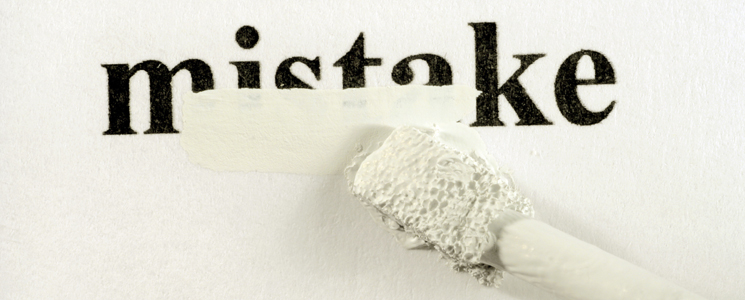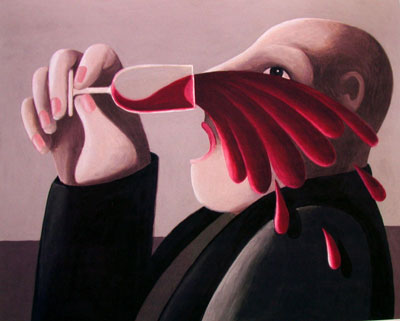
I make lots of mistakes; I'm more of a guess-and-tester than a methodical pre-planner and I always have been, so naturally improv appealed to me. And through improv I’ve learned that making mistakes can be as good, or better, than not making them.
When I started improvising I messed up a lot. Everybody does when learning something new. At first that would frustrate me, because I wanted to do it 'better' - and not make any mistakes. But when I started understanding how mistakes work, and the good that can come from them - on stage at least - I changed. I got better by embracing my failures.
And I've also gotten better at applying those onstage insights to real life.
Improv mistakes
I took an improv workshop with Keith Johnstone once many years ago. One piece of advice he shared really stuck with me. He said "Try; make mistakes; fail big and fail happily. If the audience sees you unbothered by your mistakes then they can enjoy them too, but if they see you feel humiliated and ashamed, they will be uncomfortable."
And it works - generally. The audience loves mistakes when you do too. Whether it's walking into a scene at an awkward moment, failing at a game, or having a mobile phone ring in the audience - it doesn't matter what the issue is: the audience loves it. If (and this is an important if) if you deal with it confidently and comfortably. And by 'confident' I mean 'humbly and happily.'
And, perhaps paradoxically, they'll enjoy it even more than if your whole show runs smoothly and slickly. There's a very good reason for this.

Because when things don't go as planned, the tension ramps up - for performers and audience. It is, all of a sudden, real. They know you're not playing a stock character, or idly bantering - all of a sudden the intensity heightens and everyone is sucked into the moment.
And with improv being in the moment is exactly what you're going for. When something slips up, the autopilot switches off and everybody does (or should) focus on that mistake. Don't gloss it over. Explore it and find out why it happened, and how it can help. There’s lots of fun to be had in playing with those unexpected slip ups. And lots of awkward disappointment in opting not to deal with them.
I've made lots of mistakes onstage and felt awkward and embarrassed, and then so did the audience. But when I've made mistakes myself and stepped into them, gloriously, all kinds of exciting and unexpected things happened.
Two examples: One I was playing Pearls on a String. I decided that rather than pre-thinking what would work to advance the story, I would come on totally blank. My subconscious latched onto the last thing I heard, and I basically repeated the line my predecessor had come up with.
I was mortified and the game was doomed from that moment forward. Had I smacked my forehead and stepped back out, or faked my own death, or something, it could’ve become interesting. Instead it just limped to an awkward conclusion.
A positive example. In a recent Marbles outing (a solo show I do) I forgot the name of one the characters I was speaking to, a guy who was running a marina. And so the character I was playing became the kind of yacht-owning jerk who didn't care about the names of people who worked for him. That screw-up led to the discovery that I was an asshole. The scene gained momentum, and the characters got more depth.
It was definitely a mistake, but it became fuel for the scene.
Unforced errors in gameplay
Taking everything that happens (mistake or not-mistake) and using it, is a fundamental tenet of improv. I've seen audiences applaud the justifications for simple mistakes, and I've also seen scenes completely re-routed or disassembled by a mistake, and built back up stronger than before.
Of course, I've also seen scenes stumble at a mistake, try and cover it up, or be so thrown that they never recover. We can all be brilliant when things are going well, but when they start going wobbly, that's when we discover the sterner stuff of which we are hopefully made.
Generally, when I get eliminated from a silly improv game, I think of Keith's advice; I smile broadly, give a big wave and bow (or whatever) and step aside. It's not a big deal.
Of course, at one memorable Edinburgh Fringe show I did the opposite: I had a moment of lashing out when I felt I was being scored unfairly in a meaningless improv game.
But in general I try and follow the idea of 'enjoy your mistakes'. And in the context of the Edinburgh Fringe that rant was a valuable pressure valve for me, some eye-popping entertainment for the audience, and was lots of fun anyway, so I like to think I embraced those mistakes too. It also made the show more memorable.
Real-life mistakes
The principle of embrace your mistakes applies to real-life as well. If you screw up at home or at work, admit it, be humble and accountable, and then get back to it. Learn something. Then move on. We can all respect accountability, and more often than not, the times we screwed up make the best stories.
The great thing about doing comedy and writing about my life is that all those mistakes can become my favourite stories. I'm relatively proud of the time I made Tiger Woods furious for example.
In fact, the more I think of it, the more I actually love mistakes. I don't just accept them - I love 'em. Which may help explain why I make so many.
· · ·